France’s YSL Beauty is celebrating a natural space it has tended since 2014.
Boosting its mission-driven status, the maison is taking viewers to the Ourika Community Gardens in Morocco via a new video on social media channels. A decade into service, these sustainable harvesting grounds support a local female cooperative and produce exclusive ingredients for YSL’s skincare and makeup, with fragrance to benefit in 2025.
“I think there's something authentic here in a time where there's a lot of greenwashing, and this is clearly not greenwashing,” said Katherine C. Sredl, marketing lecturer at Loyola University Chicago Quinlan School of Business, Chicago.
“It is hard to get regulation on beauty and to get ingredient integrity, and YSL is making a very good market move to position themselves in that space and tell that story,” Ms. Sredl said. “This is clean, authentic and natural, speaking to the consumer demand for something new in skincare.
“It gets down to the essentials but is also refined, and that that's what affluent consumers would be looking for.”
Ms. Sredl is not affiliated with YSL Beauty, but agreed to comment as an industry expert.
Flowers and ecofeminism
The Ourika Community Gardens are located in the foothills of the Atlas Mountains in Morocco, a nation known to have been a source of inspiration to Mr. Saint Laurent himself.
This region specifically is known for dramatically hot summers and frigid winters. Designated as “a land of contrasts” by YSL, it is this arid ecosystem that the house chose to care for 10 years ago.
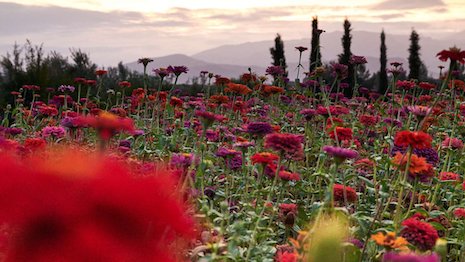 Native species thrive in the Atlas region's YSL garden. Image credit: YSL
Native species thrive in the Atlas region's YSL garden. Image credit: YSL
The brand considers the space to be a biodiverse laboratory, working with and financially supporting 32 local women who tend to the organic plants. Literacy classes and gardening training courses are provided to them, as well as instruction in sales and administration.
The female group picks everything by hand, its oils and materials extracted through environmentally-conscious means.
Thanks to rewilding efforts – a regenerative plight that fellow luxury giants are sympathetic to (see story) – 200 species grow on-site, including 17 botanical ingredients that are exclusive to YSL skincare and makeup. The collective harnesses solar power, and thanks to an open-walled format, allows for the spreading of the chemical-free native species throughout the surrounding habitats.
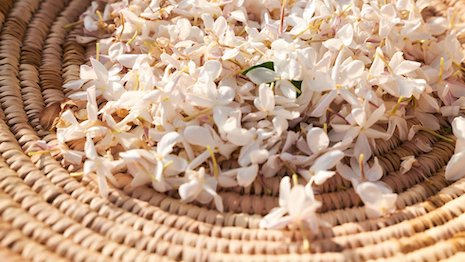 Some plants are grown exclusively for YSL beauty products and picked with care. Image credit: YSL
Some plants are grown exclusively for YSL beauty products and picked with care. Image credit: YSL
This idea was made possible by French garden designers Éric Ossart and Arnaud Maurières, who followed regional ancestral techniques to create the lush space.
The duo divided the harvest project into three areas: one for producing and harvesting plants used in YSL’s products, another for testing new ingredients and, lastly, an area that tributes Mr. Saint Laurent’s love of flowers via botanical cultivation.
Water flows naturally throughout from the Atlas Mountains and drystone terraces nurture lemon trees, saffron, marigold, cacti, jasmine and iris. The founder’s favorites, zinnias and birds of paradise, also flourish.
Other species, such as Sainfoin and Phacelia, are planted specifically to enrich the soil, adding to the regenerative qualities of the garden and the marketing appeal of the products it fuels.
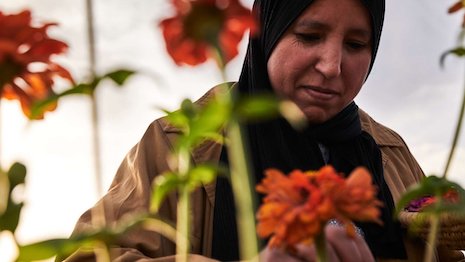 YSL is investing in the financial and professional futures of local women. Image credit: YSL
YSL is investing in the financial and professional futures of local women. Image credit: YSL
“I think that there's some kind of pleasure missing from a lot of quiet beauty and clean beauty — like ‘I have to do this,’” said Ms. Sredl.
“But when we associate the product back with gardening and the joy of being in nature, it gives us the joy that comes from taking care of ourselves or the joy of experimenting with the luxury brand.”
As luxury consumers show increased enthusiasm for green products and values-driven advertising, causes like circularity, organic growing (see story) and ecofeminism (see story) are showing up more in campaigns released by various maisons.
This latest instance has the unique angle of being a decade into making an impact, covering many environmental movements, from women’s empowerment to clean energy to, at the heart of it all, rewilding.
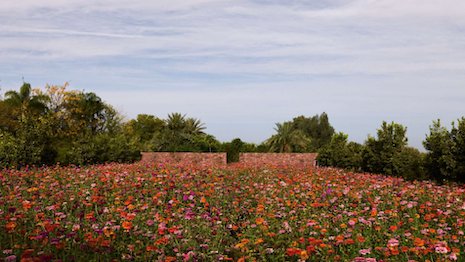 Thanks to the open-concept format of the gardens, organically cared-for seeds can spread around the region and boost biodiversity. Image credit: YSL
Thanks to the open-concept format of the gardens, organically cared-for seeds can spread around the region and boost biodiversity. Image credit: YSL
“Rewilding is great,” said Ms. Sredl.
“We see it everywhere,” she said. “It's a big trend that goes along with the trend of caring about where we live and about sustainability.
“Rewilding is really good for YSL because it helps get to a younger market that's most interested in these things, helping its business.”
Luxury beauty with a conscience
Lately, those in the makeup and skincare realm have been taking to green marketing and product drops.
Like YSL, premium labels highlight how nature contributes to products and how, in turn, they give back. French beauty brand Guerlain is among them, positioning wild landscapes and thriving gardens as the key to its perfumes (see story).
Others, such as Italian fashion house Prada, focus instead on packaging, launching refillable lipsticks, eyeshadows and more (see story).
YSL celebrates 10 years of Ourika Community Gardens
Since many are willing to pay more for products that align with their values, sustainability not only benefits the planet and the ecosystems brands rely on for sourcing but companies’ bottom lines as well. As a result, new specialty segments are booming, such as anti-pollution skincare, which is expected to be worth $15.2 billion by 2033.
But YSL’s take on clean beauty has a chance of standing out, appealing specifically to customer segments “concerned with luxury and skincare, and things that are rarefied, authentic and experiential,” according to Ms. Sredl.
{"ct":"CMhpdimzOPy47wcLJP9S81oqOD7ZZSCBAYxOauGAriLxxcXAr4U7UAIRClQ3b09YBvNdWl64eWOBtZcBO6HjPW3SGeeRtg5OZYtRAm2EILwcrOgwxGySZmdpmY0M8JF1VhTgNdmfL2M5NsKsFx7axVilQF2PDDPIFUXV3N+8UlpkAwtFTmaW\/XFYZiyQ+kDdO84aPpVnfIoGNatzLzwq2bis1EdH+dw+vI++n8mWIyPwvznHpxvCuF52Y7aGjfoZMZCHxIBwNTVzKQT0OsevT5V\/7b9c3l\/Hqd0cJWXasDHLvoiN9BCGJuPIP4layOc0Z1Z4NctuwXNABfQ2ylayfO4HjWX64sgRUGuqBVW3yXxSbM6GC1fXFoe7Hw61X6HTJJzizeVHRq+dsWwebB9YPATIgtDeMjma6OS6MRfX+zBzmzUznVbsoYjDIDGIY3sq5jo6MkjnvlfeSWZ5Q6aXdR0EO7CfYRfE2NPKmCVBoJSSeIF6+JtTVfUKwHYFcrSKFVfZIhGj2VWfV7RK4zzRLNPXR22LtJHvDjwqxqt3Uk498kHYdJEU3jbqEDyy+oMxy38tpCfDTXj759TNh2s1myq4M00vK5ymvfvRA4YwlPjpHZRVuEt+9QHZt5Q0DRVhGqndvxnV97RSp45SBJ7QkmbEH6cCh70v0zWM54HZRVBqzSWI1vC0xmZnO1AyioUJ6UaFlIE9a8LM+dndZmebtv8YGhXtd5WXBI9lfVv48z2jJ3LY+ZUxZ1tHPKC21MY6UPY5UU454HVTGReCIP\/QupFrRbAFKFQWx9h1U5BVcKMhsaLnDDtmw6sIiqndM31ipvWzH05KH1MQxViXuH+EY0qYBTc0tNU\/OcZsPu+aJ44iLHshSBWjnyy3UWK7kXE87dC\/iBEuViQOzH4THsSGUsb9LBbcba9cQoT05uC3LSwed\/JCzySOHGAUYN6pvEK73mP5l7gYzSbXOsXGcRdC44vWhJLYO0S7A5U35yr+MHyG+VzPwHlijaa7M1Sl5wmO0WLa0\/isB3FMzBvRIZbjWeywVCI7sGwtlc0onatcKq075yLrRai\/AOcD4lZezP7GVamYsOidzwQwGIG77ugvQl6AoMzZkQCDsvcAXMwoMShRT\/sz7Pg4UkCZ3o4HVLmrtyTa4xOrBd3OdA3Xj7hKiH+PP1TdK8Rb8U7JxGxAsJGvJWJ5m2zeZlA8x9OCQc4BYXXXmv1j866qnfGjPgpIFHwMoNFTJpaA\/94Ta4Rwcn63oaGIMZ+uG5jZeDcRtTIFa1TfZECKlwzLBKVH6ZyVMjQIOWTH7OR+Yqar41hP2Na7uLFdvaH5DXDa9P6+mWwddqQaDIFfbPfZCGu7+Wpp+eTMM9FIUTvluLxzZafQWNOjf9xiLkdVxAABk9PG6llZ32Wlnx6R7UTC2b1U7FSQ2P1ZUlpQicykZoXXu98Dm\/eT9OhjG9rs30TIuOyyBu+xOaR5TXf9iJAuMP\/ejNwDcILSXts7PZn\/bj1NSpZejCpKVpkcdkjagRzSTGyna3MIxx7+UO\/Z1pD0z4oyJPdX\/TNF3JDhQRt0xPmQnD3sbgJKsqOmfXC\/YiQW5nIyxSZLA8RV40aLi+AYTSxpuoPqfI4sXkQPHu4qEuVM4D613bzq54r0X4gbBYJ\/sPNPjMCzJZViqHuE1s8\/EX\/ah2h76G7+0YxihczPfpuLlCg+ZuwQlwlw4TyEwNU41URNmrtdeQmbEwWfcFo7QYndbL5z9uPzmsSdyDyw\/fvLWHIwJyBYadQe6Nx0IxxVzutYrNZqhYh2dBmw3AnGxVlD6wiTavxYXhaDG+Xtr26m8yfzAJlW4mUOP6J3Vw8qeDF\/dw3Ybf+ifAR2h\/dbJPUeDl54ZRmX2jcJE9LAsakzVbGMLs8s6Z5GlEEfTI8CvcQlCVlH8dLhwCtLRe6BfwwRWrok2tyiFD5cWSUm2lQBOKzWPCfAkwICUuYvFN3neeoz5pzPwiYTnpmPfHBxfokTXhEyI8cQcMtwFiE6\/tElZsAJmV0Ieed4cTK9aJXDdrU5GEfsvm7u0i7fwGrnGfwnS5O8W0Y\/hoyhrdZ8WxiY\/98L\/nz7Jg6ZJFiaSCVkKprkhkXhIxhUviMtl\/qM0jFUHB9eIrKosd6JwLSu6RnKw225G7gsLELWrkn6gQ3XBJFUn9LEb56CRIM0uVnZKZO4iMcmXmTZ1z6Kmkv\/CLhO4+KxhfQ4ushDpHBAA2Yp+++ObyqYEU6kNYA35wYBMH7LD85KWQlE8XkJdkieEWNs3QNy6hkOR95Jl9QEgyx6N9vth0bvhfqAyKAFtoCHkqjM4Iyi3PrYCo89k\/os1oohQM+gsWXWZdUohBzBbCrd\/WppiHeWGN8sPOrhGX+TGDsrdisr1+fhNGxtlFc\/hNpAj2dzeXZ3EGlpcTLLsQl+obDDWqfTB+oQ6PQ2WurdpD7ozACzm2UZPQbrNgEEoH6sDAIeKcU5jEktYygh+OGq0FhRLU7tWTWv9BxwmgGuBF0Z9KcWUiFp0NZo+FUDMpIuxJGIXj9Z3lpdmLMcLWEDvG7G2gCWOLtWU6+4WY0y\/jCmgTEHRmH1yFlSm1y1bLr5lYj5TWLTuo5Q4+WSu4Dw4La2iyqR0\/QETTQJiXNgWXFMIw0NsSh1YO3YBmrvLOHD0UQ8pDRDQU79uG\/tt4rMtUZ8WluJOJAWh7Zo7MeqGBVfFWn7FVEBL3PtbBYEJQnRVTWuZgoIuU0VKX7olDy5WFaAEmYw8vyqbNV0PU91Z1923hszMBOt7d9LYljoq94NYx3eLKTlod2VCLD8pOA3dQam+n6\/Dnb\/YbvyxCxtLk1eJW41PIAlMQY0ruRMOzCuSqRW1tRAKR80mfYs+ctN7i5cMZCgKNTYDkodkVDosDLEk6n\/FxtkeH\/tStWGSbDwtZZLPatCepvD5oPZDm36E6\/cfaMBzjdV4TH5wDZVmLaOE9vcA9MpG9GWfB91+qai0uNy2xsX6LOFT5tKGGV8A57JGNcIhKUue\/9j4RL1Vh+9XvO9ou4uwrQdZjrHl\/DrFGLWSgXZLMT8I+0EjZs1okqPpvSXY6ld52J7TY0OR7huz7AOVqbs\/TfWRHyzL\/uctpCWHOL80IE6EKX5v7SUteZXVUJ50JT3jHW2v+y90vSMkCFwLJzQyY2nBrzVx5NMZ8wzPJN8Lbi+TrTtkHO69Cc1Ni1k20JY44zqniQhk4foRh6HSihZZ0AJGQjVaNDsTHupilSgpwiSjq6uc0fFKAXQt8\/DdM7TNEBYSctqMXNF\/xU4V\/7VYRvh0GMPLL98wsCEkgyYwXWWlXt7oF8x1EXXeEGqLcPtF\/GDb++Eq2DmNs2Lv5kf9dcpq1JoEsklaO4AxmE1yBSQIIKVnTdITyIDvGVSbmte8DeDgOUi0qWqeN4UAmUtwqYcvEHSBPcAKim0UsnzUSHvBVVXGLRDwEFkzNu\/1En04NiNfPtvWJjjYTPi2SSgC0PAxDuedJP8Y7u1gnjeMqjc5841++6jFunkwOHjG0Y0ydWchp6F1mwMyoyOtSSknYHSehq1mdj96y3z4r37sSpBvB1ShA0IZkiIQ+VXE\/rP2isZyANYKfNHM\/fBqYM3fLdYK\/yXpAyoiDYyxSCuwZNTnKLY61tBg2xLYiV\/QfKHF7A4AhEl9nPQLcsty9+xz2BsWXqUAyq3rfR4t\/SjKnl\/ucxYROEIp961j\/iklwA5Vn8mklrF+y56c1GgsBMy1b07yBSj8PXKTgcv404C1\/zSfEx4NrOmWFrWN+NrDwq+5XSfNgCvCBlChvV3wmJSKoL66oteqdOLjrNZeQk0sTvKiUVO4d1H9MOZ9RBOj7sT5ZLYHoiUHiaFRMGlG5GqgDDH6EpL826GLJ\/BjosJlmYDER0NFhpXIt1P9BTQdw8zAymRoxdlo7gAe0uQGlDE1t59RUnuO+sWgKPYsatTBWKGcppyXCD6T4lJheLV9a3DEODXVBcVXi\/JyNeRXNtUh7rRSVmJwb2I2dtWXa1YoxrujznDo4ybZvwg\/G7z1I5X62kGyZtQGycXWJjrIbknVrG7xKM4EvyWy8UXdledjNVX82xbXKCvM7az9FnZOYcVo5KXiqkR2ik\/1U7pqa\/pjbCqB5knh9OKBocNHvMcP5ra6tG+WZbomnXsQFSkyt\/Rq1qYnWlBZNSmFcXkiE9wBEPWiwFJZAlu4INgC0rRl6y9nHzkp\/hdhvu0BdEKKTd9ZbWaVtFGKEqN89fC5DyTUn7nV2vapTTnsdOeGyrltQ6K2YFz5DFwPXcncoKKqnkgKgr0eRniLBhiZBNRY9vJOhHckUFxbi9xK7eD+cztocNuW+AItV4dr5T30L5uMR3zuGlJ3eUQ9dKG3Mn+clvgbGtLuDiriTqFugUxRn8gjHuavThf49BtVOqXE\/tk0BI396LAjhi8TLZ66xOglUgRybfo+w\/WlTp\/QEk7fX6rpFzuldi34gTxa209Z0FHR5FMPoTpu3OE5E6LBIS6w4+0bLR0UxABNJ1+NOpwIG8kbbTZ0WyBiRO91iww074sipZKf+dFQ8pbdlZA1n99Cmwk064jOVqPaQqV\/wMt4u5ZYLyRySKZ0w7eue5o3n\/FL+wAmYPT+RvlNzUg891KuUUwiJVS1d2Oxhzy79BxkdoDeTnSSl8+yIK\/Vd8AaoBHHFqXQGSbN5DxWvimSpTm7cylfnM+uWECQDDbG6Y8pEYt6l4JMMPx\/f+pjwhg6Eb2C5Vlb5DEWnCBnAfaH1E8GACE27jSdWS3XFCZc7beP0REoaMpVP69QocIRfb5aZ2Gxw\/nq3T9VgjyRHYfTaVteEdGQEqrzSuAG3GSQB7Ej7Oa+4SN2\/WCsDkZ7f6zzoQP6G+7zINi2IW1OTKoQ62P2tjwcijiJfNAfgCi52\/0PiibO9qcP50ciWJvAeZWjzr5TQObILxMv5YA1XHpcQCSoG50oU1salIOXUOSQ5vv5\/9Zq4kZFKPEuf4paXwwGe\/uld\/t6Q7W\/OeBJjFcdwoUIgTWxk4ugeGvdUjzmpwei\/AR8sp7g09mFxbgl1DVIwkzyAWR\/pNd6RSt+PiSv1D\/HBfz8mxg5RFBI0pDDRBF2chSy6Egsa6NKcFnHjvhe0e4VysQKorAPht67TNOBI8VN2yznD\/zs2wFx32DT9T8LC+KovzVWCpIQ\/w776LzzQwYKJw80TuuBNil+5muc0UwL\/5N46DlpV246VHZg4wf+ytSApCLEjB33TBbTmBzYexADqaU4Kn6PGizvAyX\/L5P\/HUJ7docnkxXtWMosBHtrNsQmz7GwCcl2m\/PK+TLavyTsbM+SiwG5d4VHygapyGdzYjLEZWpUfXD2iFOCwrT5wbzGFSA5fZPcOuJjhMM7uB\/PQSfyeyWKn568sUs7vtoc9ONt1IWnfpCk+t4Aw2LGmLDtbAKaC7HiNuS3lCYmfVzFctXMv0KFCd4zoKg3S1wgS3SgC4bbtGjkzZC74BbQz4l6dP8v2sTgeRog2kfkh2kmQ0Q2swWUa2a0Ng859zLNqEgAOgdxg5IcVb8DXDpWkKBhNEagvTbNqF8gN2Z\/EyXyrsFUkKUHjCsIVQjLgOhzkq4b\/ViJvr29Q3o0LHjddiFicTE9gFN5by8YgAX+MXdrjgPaPXvMnCKew3etbrn7l2TG5cCPa14jq3azd0y4EQ43HAyivxinXmgXIGV1tX4LLLZXymhA5VzzUk6i1L00CiFqIqImoru8fBun44zP7aMGLo+U8CgJOmvW4RWOjSQ9IAPMQ7y04i5DaqlPtjJb7mtONu6Wt23PN8Uca7z4zSk0F98\/5VYMJbyN9vYUr+FsIMnhpvaOyC740k9FnJFZKvZjdBHSEIqJ1BLrI9z2eEUuuam6dMydVaQYkEjxnbJTtS70ZCJVSOkAL8yV20oA3KynYJfqRpQJ8hMx9cxrzl\/9SouL4i3ATvuhjLNvGSxtEb93GHb6wwVrEBsldoJBbkqDb9+sTStSfxfp83bxNsZ877f2K\/ufr2qB8Hc1CEO8xGt7fvtiNvolfj0HAoBh9Ayxu43P0gn+TGDlplbzLExxCd3qVj8Ik43XPy7dAzOBN8ClPXdOStDx63\/bHzEWU06xORHcCeUQf2NTNKwZyhgBDK1gCUqlJR2gXDGDvxiYbIhdXzSV8mWbsdmqoF8z+bywGKZ3Y2Xj\/WxiIh3zlPixwoO258Qv2OHsrP+cMoQySG6rHsZu1TTGJFTarLVTfM3iIpbBXJEKEK2eIrVaeL6CMrlJg1hxiqC87nKV94IRttKI8QqV+2qwFrcHrTKbRMcWepMrmhzvsL27inIMnRVxnpn1F5Wd+GjDi213oy1gHhOrxpeK9\/zdNEdbBYcsEriWatOprEGbtbt9FbgoHkdthfrGe7RgapPFAcozIQH\/SYi\/Ilb3RPz6Dde6DZnYBe6qUHhNPR51c6sRH5t29YcT20uADCPK+J3NlOXMuQAeUL38AszXOsAhZl5g2+NjGIpaAZ0AjoQE1PMSoBKPdqtWf6B1FHZMmO7iECnKBwCbSSecneBVGchE0tiWcw6L6JSuru+ZX75ZqQNcuNaEISTDz+TgRnLHna0sVYVtVzGeoTa61p7ImqSdxrrn2jEHHbIpPRjPmstlzA2nXKg12KtzKmgFc7Vm\/hprfGVGgMIKZvl5+rbQoDYvyk8uXtSbl2LlLXHpEq9eC44zjMQ0vVM24PQEBwr33AbWPtOQ5vWvQ9n86O9jvHumOyiJYjwSP4kwbxXFDLxDgGWfsYDziJKXa1lGHWG1QY9mAQFx\/6xh6W8RuDExHI75nLVCtpmBHjutOVapE446ztTAk1rAzfN3LZkIn3MOm7ehGHg27Oj3NuE4T4jxU0gQx2vjwIOimBWwCRaLAr2O\/sdED2gnQzo+5VL+QYCQxB5hw4N8+ts5\/t8CCox4zNBMDTLCHcgswbW9bArwS2LczGITKp46MRvb1xcfaOk061eQrhddUdF9bFcWs5vRgSHvZcwmAyj461BYAa8RWLDJDFLqHFyIVR0+NhJhjGUO+aAFQJsaTZnBfb\/KqZJ70sZekT+L6l0mqpFplwc26eU3c3KzX\/G4Wl1zL8lsZ0IFRKi5L8UNF4XqysSlrRU8vbfIqJd9QMQ3+KA7RLUCKdF6mGFhoZzGjnXoVb2xuvemjSnHjEwXsYoazfAHK4aJyVNVjrKTMwC+qc8eluXDAiRV5tBWFxnQ3cbxJ\/10uROjERHEslUnKVCOoTpP92qHAjzwH75tAvXhNCgFOS87k6gPrisfrQnYhxggcxr0FoKIzzXgHj5sSJSNviHgEP+wciVLWXb2PGtMqaReDIlWxCc1zO4bUcx84nAtE+Vjwbo6R96Gzd\/wJcbbzt\/rkXSD9o7+kpOL4JQpLvV4o\/X3s4h7eHSqUf3+dHCqf1z92k4N1HDCoCmR\/tERv+V0rzEFVgKqWwitT28IxWeCZSf8jl6gE+QELiby22pVDoXciSc5So280phaBCzymoA8D8w3k5xPqOiFaj0PHCoiXu+aIgNXzu5qGpfAnjT3lily\/0\/yIkCrGCysWe5lrKHBe89qrD0Dqwpy\/c3yevR2H37XSdmKOS3+n1JLRjLJOssirawpmr4b1qp8LWH23O1fIk5E25oIITDQNRrXdZbGkpLat4InqIW+FnAc+qdLMGiIh39RRMCzb9NY0tMDPCQjuSFFnxmWgxqWSgx\/2vVCftOEn63ztoQ3b3wXero9PrrlLNLnqmiQN59DhO+0We8WkF4MRsvsUV5P7jWyfCwFOn4DyB29GTI3h5jKdPfxn6q+aMro+rReCCyyW81YBVIy1T4WMSgHjRdUOZNaXiL5W7sP2Wc1IDJedUBkTGEbTiCb1UJMglLmN7giPvYghfN8Sr0Jsfkb58f\/A75ipCPcbuIdCGOnnrrURlYSB3V4QWWFiteWntYik4fWgVeGh7JrXGQqPeGwkeAr\/rrx\/x3z9amj60cdg++dDvEiB9nc4sOKygHjM25JawHTJt26ZoyXMk85hVoKHYEq5IYPLfsk3VtXvNjUqBU37j6LE8wBHwZC2WpDOr4Xa8S+n5s+yyYcATQw1p06k3aBQsNvFnYqWbFeXDNAL41SShYwlWH5WRJj2ig23U0ZY6vhLeazKXxNgi2CMh57L6ah9Mi+z9P3NrbWPxLPJJ+N5ktTh+PkK3xYc74U5w8XS8msG3L3oL9SkZDKYkDRXJff4IniLW8eHx3MnZf6sqHLCRQOz7+bg5FkKmwKsiKP6rp3ob5tb2PZA4XLbF4ZTAFKtembsSNrQs\/tBnB+wwB5S6rD\/wTlvPlwpJgobE+\/lGQi40cyT4nQIqGLbrhK1HphCEWKALUss2p9jqyHFxgIPcwx+ZFs\/aVObCDGWVl3i1Kme21HZFF77+c7khz\/MncpXSJ9\/bPxAyM8vT0SVYR5Q9ATIztdvMFcFMa\/\/BS7K8gczjS5j2\/ZeQ3CFlm+ncUzhukfMGysYQj0lbC9Xf+kYLWwnV5RGbp3MxQ3TY8G92BMdtv7xfXY\/RUAhdRmzqUMccAGcHf1vrxZLo0D+Ks2mWRB1QmOBg91Hpqpw\/GikaPkZIAy0iDV1gYScdZM9BwhveZdCBMsHZd9uqVJqMCke2FjWg3yzEQBQD6OG3jkeFV79UvLtK0cHptvDnqKJfg+bf+ZD40IyAMS+N3ds2+rT9L3MH7aIaMAD4pt7bt+OUUyqzhYArrP7cGVpiKNGkOzZoJ\/qjEwd19OQCvg2kTfOFUkDESycPEqsRivNVR2olcft8KtH6Rqeae3DP0Ym8bm6ZTXxTr0DdBh\/4v\/vf0LFaW+nEkK+zt\/D6g\/UEa1GR2nwreoCIWd05R1TPJot1chCrCMqZLv1XOBLfq8\/hcPJmAIb70dVXsUN501V2zFpdaIYZYN+4O2NrNiATINBCFwJe8q+ygsm9gSQ34qTVavtBZVBGP5Ejj0tcZfR6hFWsGNv9yP+V9vTROHaV8dKA7LUFnjQ\/b3fwYAoHM+L0HkzlrVAnJY3S5Bl3DXwzaXzZqrSLHHLcuOAqmb\/8MEUbhwRFJHW7LA9NWWaDyVbdzKAYnvADd8SEaMYiMkY3oocJ\/QchdZzpkZrv1WyvAj5HSA\/C2UxcYrYZ9lyiYRrI8RI+EEsRaAul8peQcklJh81cd6sVaDmR7FWVtJjIT3c8Se7xR2pZ1e+0pp49LfwqeGzWMU8OjS1TaGtIu3WeyldafNP85QU97C3AYnf43dy4ap0VYa1NETHy+21OsuFkfYVQ3C9WtiL2aK9Mf12ZA1BDGuGk8D7dD1YhDojux\/YoKJaM8+itafQxNqop\/9\/pe4bdYPymYjYUJY6fRoyNP12w8\/f5TqIEHdAlK3IHgkLl6peFd3VRftJ56+PvleTsWlNJtLMP8ToX8Ha0nAhoK0Hv4Ebx5gUlPo8hmqrvdnFJRnQzUdrgGxiHRUSrUXq+Dz804XQBrJ3wMYd7ZxhKTVYmRFDT\/0m7HNY8xE5KXGhmY5C7W0kF1NIFfQm1A3CRXUv0gvYG+bqg\/1leF494nZJWoAcvRq2h03DThgr48NGRqwindRjUJxnvyyA2+r4gOIi1vAwx+dHisUyGSLtMaVuSzwZjaJIMINdElk0cxTGptdLGggJn1GU7AiDaXuHHW4m3J\/0RaJQtFF\/Dk2eBt9eJ0GIG5\/GU9tzb5WQ8nvB2pA+yD\/U2hskw5PW8pVlK633Oy8+btcYvhQAFd\/pME9JNvPJcw3fmKmIovZ6CiGHgD5IAgzNLzHmLMOSH9gFOGoB0OB+Q1I\/1vhDtUNfpBd3yFo9xJ\/uYXYzXugTS1+p2+WXwePkuMe4umIEznIeZ50GuOyTz12jNzghzv6WSFUSPJOss4yy7bkImKm4SxV2y01gpJ4WzmX+f14O+VriPhOMXOVsmS0LFR3QjFscImS8+UVQmodxD48GnhDrVMEWKdHTgO1O1iJPppOEqVkFfPH901pNcjyoDdF6R2vUsp3\/Y4RSZnQ1uyvZDoHkYJmR+C9dL8FDorKKad5lJSfPVU8eZUplQ+3NEEmQJ0q9R6AQei1FvzmY\/eOpNUIGSlhTNrZ4GI3k52rHCBxo9JOIqwuIAVhYjdVr\/QWVFLFgif5vd6L4gzp9hXrEBZAbOykGDca1uxoFGC8zF\/PDwF35tauenr36OsQrKjMOTr00zBhIIyEvxEOHeTyUTZqeS0ahivfWrPe00+KR2Cl+LEz4Nz56VopC87rXhKKEZVpnZM8gSwKOILxRZXl9MqJ16EAqxjqDLGCUlYpl9iifuLMVT6U2+96LOv+kFfuu\/RPvuItejhM4V4W5p1ce6SZFXinXXcQP41Wd0+VD7RXsbVBzMHxfLuY1BcYY\/bQr7eS0dvZgYi+ifjZg8kFumEuxpJR\/6GE4L7eTN990k8VQ5aEo\/tHi2RPdIP2ojxo+CDXWZR3FLnAkANUb2ZBHMR0Z34JFIJk6QJ8Ypc8ECBLnHCndeQ5trl0a5Rsa8j2eOYlEbOyhranNzLwZofTUmqFzITwSqHz3z\/oZxKRw1Cx9N0HFrFvY86GTOy3hAaj+cc32QWmrjmS57b4FPcLYX0v8ie4Px66z8BUtiymDf\/tHD7j\/NtdHr2sgS1y0+EmdsKkjSGGbQmKJKBdESymYZgYvln9Jg\/HxKx6YjY\/mBPba\/i+V9TVgba7dBomGJsIpzawdYla70EDvQSYdxk0pQIqQ9l9kkk3FytUt6LT2sWKJrSzIIfld+Cm+NtM9VlXNkVDzGGx5YabyRftOBKRssWg1iXrXfRQ\/LYIZbTUMIOSMPO97WTiBgfhEAJ3\/Jxuw0tuIBETGGhKDmigRqNkEoYEmRzuKLJGiJtBXiC7lP\/TyrYjVHbgxl6O+Ie1f0jNuBMXhDSO5E12SgEGMK+ChzmYyST+dUIZW0lhnXFTRs4EM5M55EiPnWAXZYr7LQpAH087N1i2QYN3yjU2Oo79pW\/sqmlLNgMM5SmEHQWnTu9Ic4KAyb4HYGz7xRD4S3IM+iY4c\/NKAGC2SL+hAVP04Q2ay\/IGGoEbFObch1Bagtpj9XFyrdP7FHOJ6ZpZzZSuNUy5F8+QjW7WEpzzDDlpeoC8OxztaaxafL3RGu5imb0dwbzUy3lgTHmasPXsumA3Kkk952nOLcpNmqMT4ayZf14aCp4suyuH3LrRL2A1nA7j0iwlpssQtvpp9NxSZBwzG8gvgDrPa\/1tI77gx\/c9PjHa+8T+JW1OoxMXQF\/6LkvpKKyS47wC+Y0DcZC1XljEPcSvWTbKsiqiqhxClwDfZ7W8zY22E7\/TitmXeQviPm2hw1HL0RwpkK0J81j+ioQ\/UA5pFTkhbUPi\/pxESGmI1O4KfppzfdS+sC4zEbDCzo9hhtZLSzALfhieAfpRhIZQ55pCZO6TLsg5JaLRb4UmmoRLrQTgInhbwaGPumwwBl5TWjrW6yOVetQGbHU1opD72Ny1fHP9nGC0Ea\/eqIOIOI8Ha9SFFT5WuA59\/\/jHE5ZP3J7DKmWiGTsuzCce8X2+TLTjeVlFgxl6uxU+d8eqAcIXSVoeM6lBqjwJjxLdurpIEjfDf4OFiXH5taNNhc3Oq07YDxEjXWTp9k1Q0nPlvTo1pwl1m023loRZg==","iv":"c100a2aff669d2d0ba0ab2e41d0de51d","s":"d0b6f06d43c38e91"}
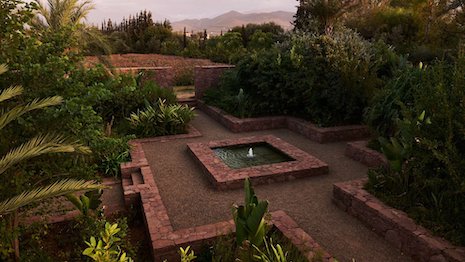
 The grounds feature 200 plant species, 17 of which are exclusively grown for the maison's skincare and makeup. Image credit: YSL
The grounds feature 200 plant species, 17 of which are exclusively grown for the maison's skincare and makeup. Image credit: YSL  Native species thrive in the Atlas region's YSL garden. Image credit: YSL
Native species thrive in the Atlas region's YSL garden. Image credit: YSL Some plants are grown exclusively for YSL beauty products and picked with care. Image credit: YSL
Some plants are grown exclusively for YSL beauty products and picked with care. Image credit: YSL YSL is investing in the financial and professional futures of local women. Image credit: YSL
YSL is investing in the financial and professional futures of local women. Image credit: YSL Thanks to the open-concept format of the gardens, organically cared-for seeds can spread around the region and boost biodiversity. Image credit: YSL
Thanks to the open-concept format of the gardens, organically cared-for seeds can spread around the region and boost biodiversity. Image credit: YSL